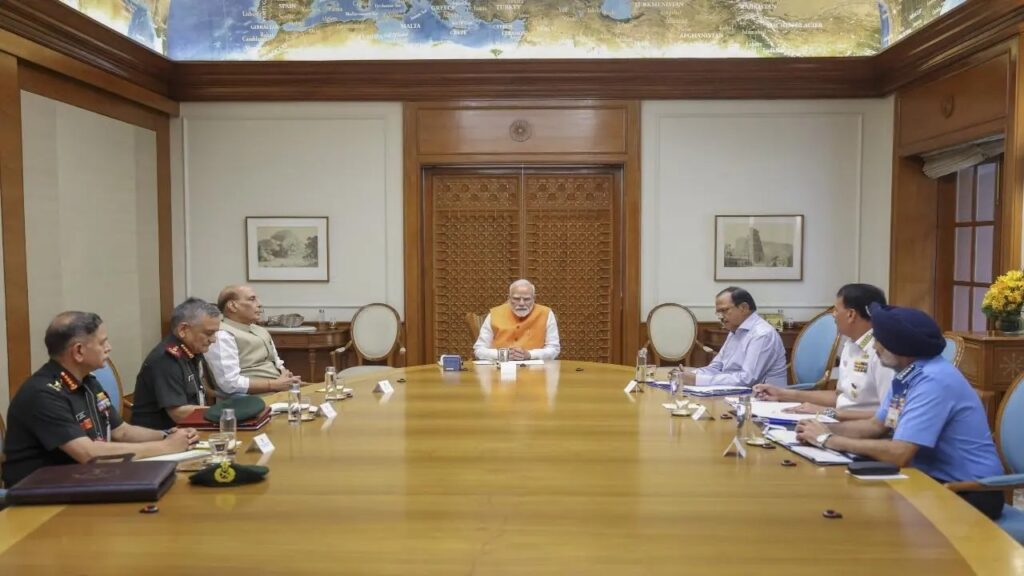On April 22, 2025, a brutal terrorist attack was reported in Pahalgam, resulting in the killing of 25 Indian and one Nepali tourist. It is noted that the attack occurred after successful elections in the Union Territory and its steady economic progress. A day later, the Cabinet Committee on Security (CCS) held a meeting under the Prime Minister’s Chairmanship to discuss the issue’s seriousness and formulate a comprehensive response.
Measures against Pakistan After the Pahalgam Terror Attack
The CCS has proposed to take strong measures that will have significant long-term implications for Pakistan. These decisions will impact military postures, diplomatic relations, economic ties, and regional stability.
Diplomatic Repercussions
The CCS has decided to suspend the Indus Waters Treaty (IWT) of 1960 until Pakistan withdraws its support for cross-border terrorism. The treaty governs the use of shared river waters between the two countries, and its suspension can affect Pakistan’s agricultural sector, leading to significant economic disturbance.
Moreover, India declared the Naval, Defence/Military, and Air Advisors in the Pakistani High Commission in New Delhi persona non grata, ordering their expulsion from the country within a week. India, too, will withdraw its Air/Navy/Defence Advisors from the Indian High Commission in Islamabad, restricting diplomatic engagements. Effective May 1, 2025, the overall strength of the High Commissions will be reduced to 30 from 55.
Military Response
The Prime Minister has granted the Indian armed forces “complete freedom to decide on the mode, targets, and timing” to respond to the Pahalgam attack. This military action highlights the government’s resolve to take strong measures against the perpetrators.
India’s retaliation measures have been strong in the past. Uri, a surgical strike, was the military’s response to the 2016 terror attack. A similar retaliation was carried out as the Balakot airstrike after the Pulwama attack in 2019.
While the domestic pressure for a swift response is rising, military sources will launch the strike only when they are fully ready and strategically aligned. If the schedule of the past retaliatory attacks is considered, action is expected any day, as it’s been over a week since the attack. However, the government is determined to strike only when the risk is minimal and the impact maximum.
The senior ministers’ current sentiments and preparations ensure a retaliatory move focused on “when, not if.”
Economic Implications
The PM Modi CCS Meeting for Pakistan decided to close the Attari-Wagah border immediately, allowing only those who crossed over with valid endorsements to use the route for return before May 01, 2025. It also imposed restrictions on the entry of Pakistani nationals into India under the SAARC Visa Exemption Scheme (SVES) visas. The SVES visas held by Pakistani nationals are now invalid, and those already in India under the SVES visa were to leave India within 48 hours.
On April 30, 2025, India also banned the use of its airspace by any Pakistani airlines. A week prior, Pakistan barred Indian carriers from using its airspace.
These restrictions disrupt trade and people-to-people contacts, affecting businesses and individuals dependent on cross-border interactions.
Pakistan’s Military Crisis and Internal Struggles
Post the aftermath of the attack, the General Asim Munir-led Pakistani military is feeling low on morale and facing the public’s disapproval because of its association with political affairs and the rising insurgency within the country. While the official sources have disregarded the information, there are rumours of mass resignations and desertions.
PM Modi CCS Meeting for Pakistan – Final Thoughts
Apart from the CCS gathering, the Cabinet Committee on Political Affairs (CCPA) and the Cabinet Committee on Economic Affairs (CCEA) also gathered at the Prime Minister’s residence to discuss the issue. Many Governments globally have condemned the attack, offering strong support and solidarity. The CCS has directed all forces to maintain high vigil, reflecting its zero-tolerance toward cross-border terrorism. It has resolved to bring those responsible for the attack to justice and hold their sponsors to account.
Article by Gayatri Sarin

